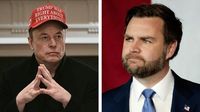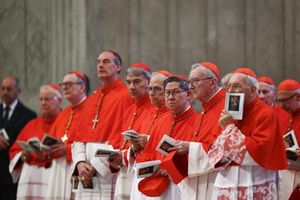In March 2025, a series of misleading rumors involving tech billionaire Elon Musk began circulating online, revealing a troubling trend in misinformation spurred by false claims and social media speculation. The inquiries centered around Musk's alleged offers, criticisms, and actions that caught the attention of various audiences, notably regarding his alleged interactions with political figures.
On March 23, a claim emerged that Elon Musk had offered to donate $10 million to Dawn Staley, the head coach of the South Carolina Gamecocks NCAA women's basketball team. The rumor, shared across platforms such as Facebook, X, and Instagram, suggested that Staley shockingly rejected the purported offer, stating, "Keep it and spend it on something that actually helps people!" However, there was no evidence supporting the existence of such a donation made by Musk.
Snopes, a well-known fact-checking website, rated the claim as false, asserting that a thorough search for credible media coverage revealed no mentions of the alleged donation. It appears that the source of this misinformation was the website Btuatu.com, known for publishing sensationalized and fictional stories for clicks and shares. Further, their articles were flagged by AI detection tools, indicating a likelihood that they were generated by artificial intelligence. This is not the first time false claims about Musk have circulated, drawing attention to the perils of unsourced social media rumors.
Meanwhile, the atmosphere grew tenser as rumors about Musk's relationships with political leaders intensified. On the same day as Staley's alleged offer, a purported audio clip of U.S. Vice President JD Vance went viral, with the clips making the rounds on platforms like YouTube and Reddit. In the audio, Vance was claimed to have criticized Musk, saying, "Everything that he's doing is getting criticized in the media. And he says that he's helping, and he's not. He's making us look bad." In a striking assertion about Musk’s identity, Vance allegedly referred to the tech mogul as someone “cosplaying as this great American leader,” highlighting his South African origins.
However, the authenticity of the audio clip came into question shortly after it began circulating. On March 24, Vance's communications director, William Martin, publicly denounced the clip as “100% fake,” implying that the Vice President had been misrepresented. AI detection tools like Hiya's Deepfake Voice Detector and the University at Buffalo's DeepFake-O-Meter analyzed the clip and indicated it was likely fabricated. Given that Elephant in the room, this clip exemplifies how quickly misinformation can spread, especially in the political arena where tensions are high.
Adding to the chaos, another rumor claimed that Musk ordered Tesla to remotely deactivate the vehicles owned by Democratic Party leaders. This claim, too, started circulating via social media platforms, notably beginning with a post from Facebook user Mitch Mallett on March 23, where he asserted, "Elon Musk just cross-referenced a database of all active Democratic leadership! He then had Tesla shut down all those cars."
As chaos ensued online, Mallett later issued an update on March 24, noting that his Tesla had charged normally, suggesting that the earlier claim was untrue. In his post, he claimed to have initially believed the message he received about Tesla shutting down Democrats' cars, but later clarified, "Woke up this morning, the model three was charged to 80% and worked. If this was meant to cause me stress, I refuse to admit it did." Yet, the initial rumor had already spread widely across platforms.
These incidents paint a grim picture of the current information landscape, where unverified claims can rapidly gain traction, creating confusion and mistrust among the public. It is imperative for individuals to verify the authenticity of information before sharing it, particularly in politically charged environments like the one we see today. The narratives surrounding figures like Musk and Vance highlight the consequences of misinformation and the necessity for accurate public discourse.
Amidst the swirl of these allegations, the need for diligence in discerning fact from fiction has never been clearer. As social media increasingly shapes public opinion, ensuring the integrity of information shared online remains a critical responsibility for all users. Unsubstantiated rumors not only risk damaging reputations but also undermine trust in legitimate news and communication channels.
As the landscape continues to evolve, everyone involved, from social media users to those deeper in the political establishment, must prioritize credible information and commit to combating the spread of false narratives. We will continue to monitor developments on this front, especially as financial and reputational stakes remain high for all involved.







